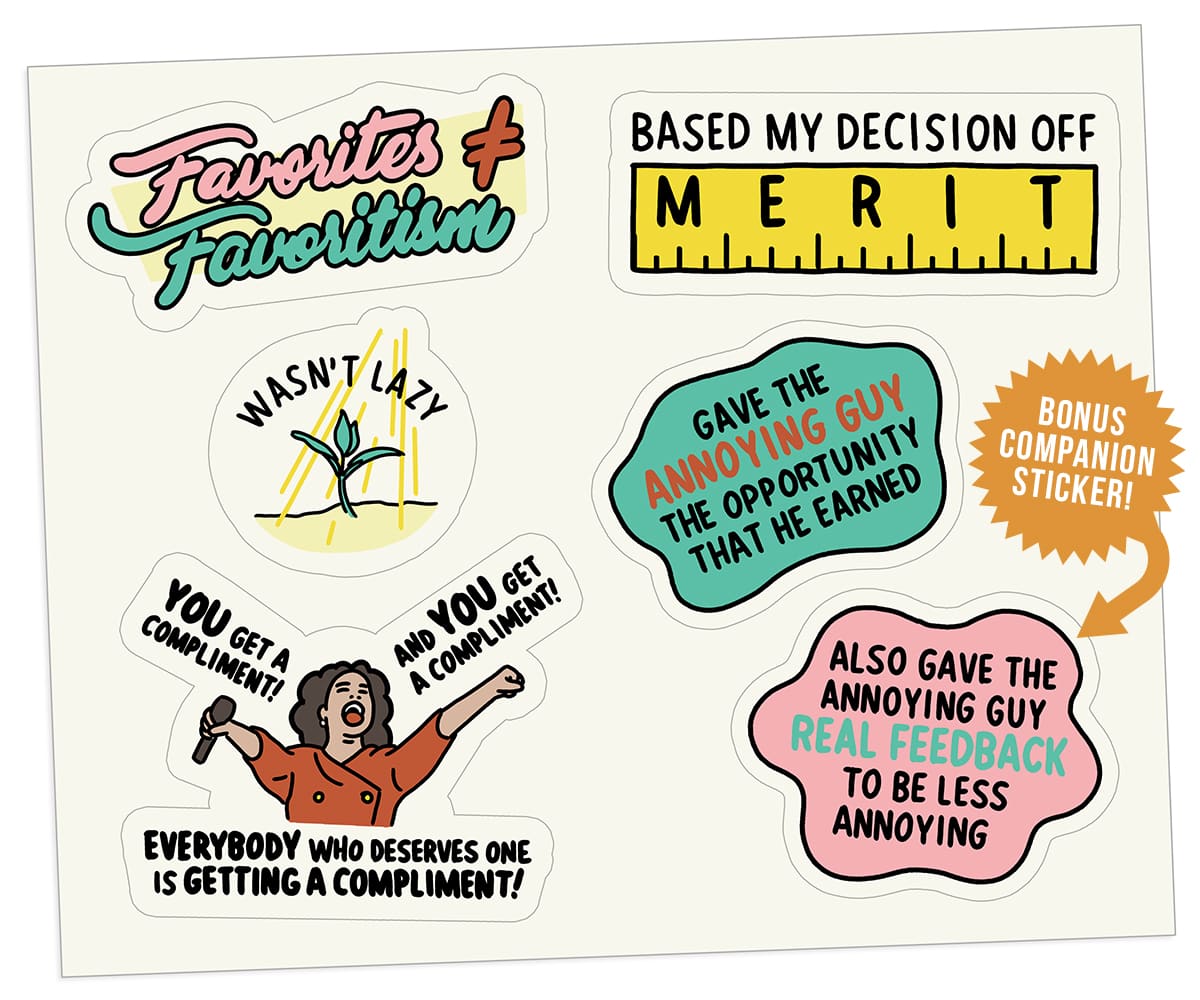I’ve been on teams where charges of favoritism divided employees and caused lots of drama. How can I avoid that within my own team, especially when I’m recognizing/delegating to/promoting top performers? Am I doomed???
Andy: It’s such a good question, especially coming out of last week’s issue. But no. You’re not doomed. The very fact you’re asking the question means you’re not doomed.
Emma: Totally. All the places I’ve worked that had a lot of favoritism drama are places where the boss could care less about team discord.
Andy: I think there’s a difference between favoritism and having favorites. Of course we all have favorites. Favoritism is when that unspoken stuff that makes someone your favorite is your primary measuring stick. When that happens, the praise, the promotions, the opportunities you’re doling out detach from the reality everyone’s living in. The outputs don’t match the inputs because no one is actually sure what the inputs are.
Emma: I’ve been the recipient of that kind of favoritism before. Don’t get me wrong: I loved the attention I was suddenly getting, and it’s not like I thought I didn’t deserve it. But no one, not me, not my fellow teammates, probably not even my boss, could really articulate how I’d made it to that next level. I had nailed a really important presentation — was that it? I’d made my boss’s boss laugh at an office happy hour — was he somehow involved? A former favorite had screwed something up — was I just taking her place? It made me really unsure of my footing.
Andy: Favoritism is inherently lazy. It can stem from black-and-white thinking: This person is great = everything they do is great = I’ll have them do the great important things.
Emma: Or not wanting to put in the effort to figure out the ways the second-stringers on your team are doing good work. It’s easy to get sunlight to the tallest, leafiest, top-performingest trees. It takes time and energy to get your rays to the smaller growth.
Andy: A lot of favoritism I’ve been guilty of came from not knowing how to give tough feedback and avoiding it. I remember I had a report whose reviews were all glowing, all positive, all so encouraging. So why didn’t she get the promotion ahead of so-and-so? Of course she assumed favoritism.
Emma: Oh, I’ve been there too. And I think that makes a good rule of thumb: You’ll be safe from slipping into favoritism if you a) know what the people on your team want and b) are actively working to get them there.
Andy: When I look back, I wish I had given real feedback about where she didn’t measure up. This could have come out of an honest coaching conversation:
“What are your hopes for the next steps in your career?”
“That amazing management job I know is opening up.”
Instead of saying, “Totally, that’s a great goal!” even though I knew it was never going to happen, I wish I had said:
“Yes, that seems like a clear next step. I want to be honest with you about where you stand and what you’ll need to work on to be competitive for that position. If we were making the hiring decision today, with the information we have right now, you wouldn’t be selected. In order to change that, you’ll need to do XYZ things. Do you want to make a plan together?”
To be honest, I didn’t really want to work very closely with that person to develop that plan. She wasn’t one of my favorites. I should have been more direct about that hurdle, too:
“To get you where you want to go, we need to break down the shield that goes up when you’re getting feedback. It makes it seem like you don’t want to grow and that’s a real disqualifier for future promotions.”
How Emma Gut-Checks Lazy Feedback
About once a quarter (or anytime I feel like I only have one or two go-to people on my team) I like to make a list of what all my reports are gunning for. Then, I inventory the opportunities I’ve given them in the past three months to help them get where they want to go.
For the people who don’t have much next to their names, I write down the reasons I don’t think they’re ready. Then — and this is the most important part — I ask myself if I’ve told them, explicitly to their faces, “I don’t think you’re ready for that yet because _______________.” This is feedback they need, and what I’ve probably been avoiding giving.
How Andy Makes Sure Everyone’s Good Work is Noticed
I’ve curbed favoritism by giving a compliment to every person on my team every week. I thought this equitable distribution of compliments would come across as phony. It felt forced, that’s for sure. But a lot of good relationship advice I’d gotten also felt forced. Do I really need to tell him I appreciate him every day? Yes, I do.
I kept track of my compliments with a checklist. I had to block out hours of time to look for good work. But I did find it. And when I didn’t find it, I discovered a true under-performer who needed more intense help. That was a good outcome, too.
Good Boss Achievement Stickers: Favoritism Edition
Celebrate your victories with our weekly set of Good Boss Achievement stickers. Soon, they’ll only be available to paying members. Become a member here — it’s pay what you want!


